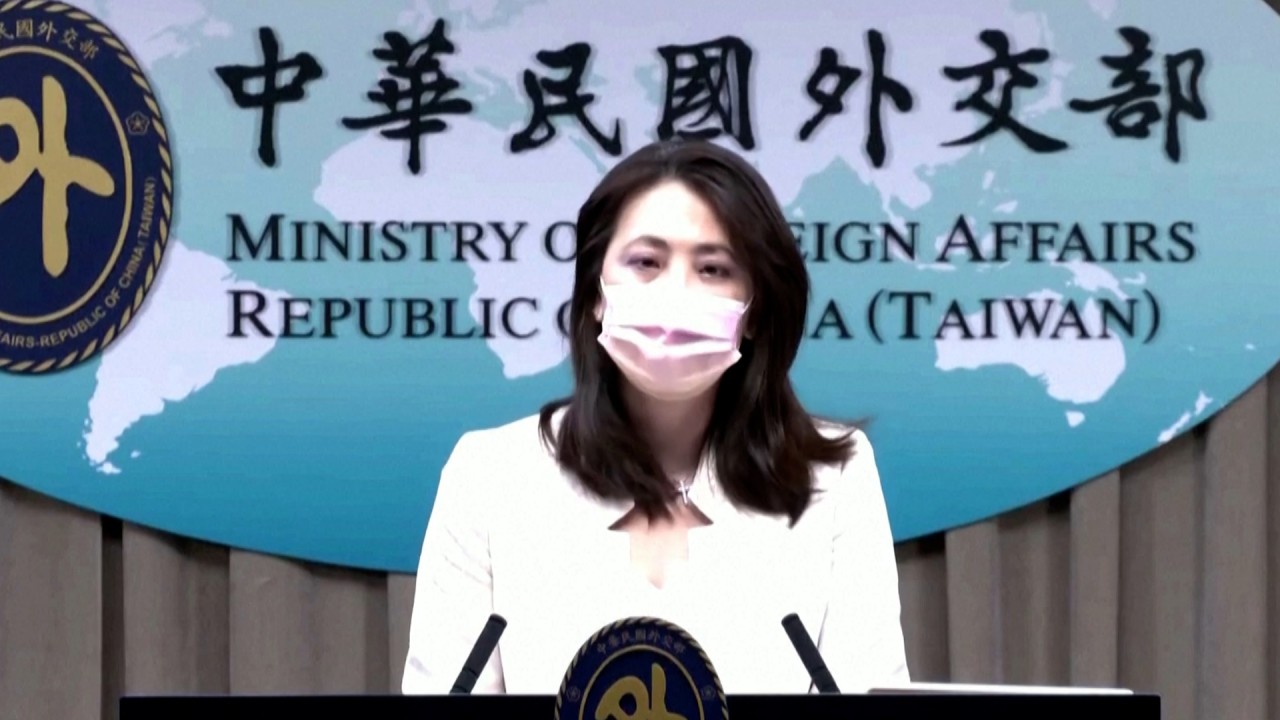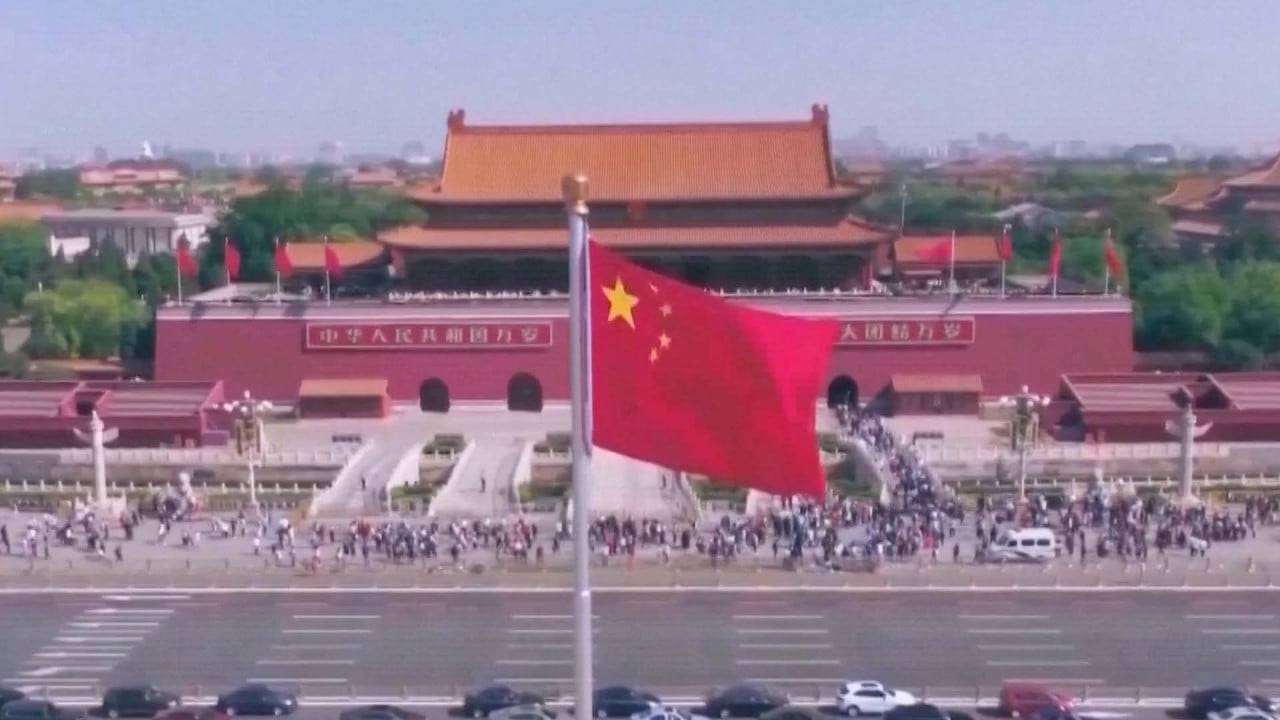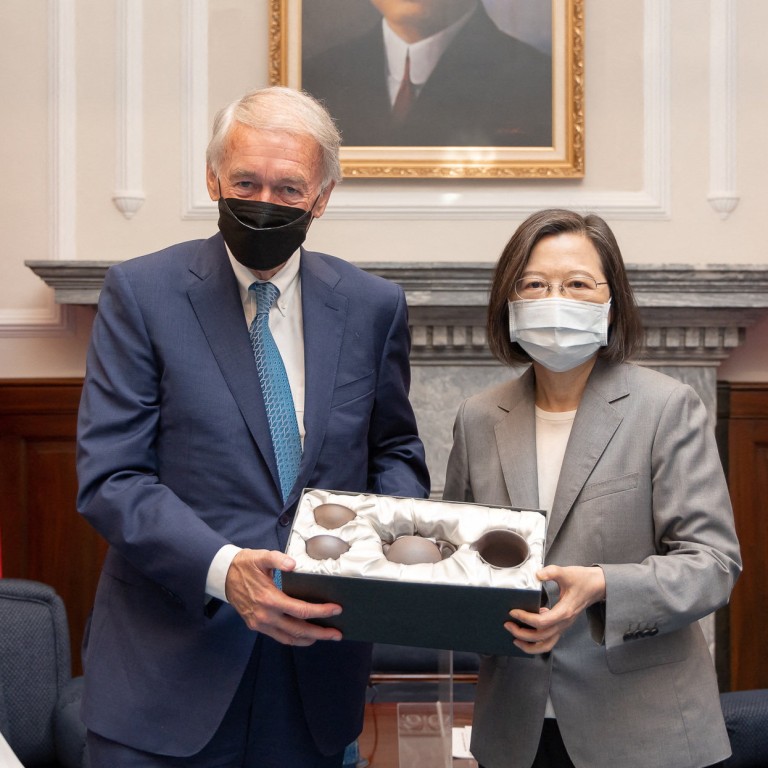
Beijing starts more live drills around Taiwan as Tsai Ing-wen meets another US delegation
- Taiwanese president holds closed-door meeting with first high-level US congressional delegation to visit island since US House Speaker Nancy Pelosi’s trip
- US group says it seeks to reduce tensions in the Taiwan Strait and expand economic cooperation, ‘including investments in semiconductors’
“This is a resolute counterstrike and solemn deterrence to the consecutive provocations by the US and Taiwan that undermine peace and stability across the Taiwan Strait,” Wu Qian, a spokesman for China’s defence ministry, said.
He added that the visit led by Democratic Senator Ed Markey sent the wrong signals to pro-independence forces in Taiwan.
In Beijing, foreign ministry spokesman Wang Wenbin said Beijing had repeatedly warned against the trip, which breached the one-China principle and the three joint communiques signed by Washington.
Wang also said the visit was a “violation of the sovereignty and territorial integrity of China” and cross-strait reunification was a historic trend that could not be changed.
He urged Washington to stop interfering in the internal affairs of the mainland and warned that any attempt to challenge the one-China principle and split the island from the mainland would be crushed by Beijing.
Taiwan Affairs Office spokesman Ma Xiaoguang also accused the island’s ruling Democratic Progressive Party of repeatedly using “external force” to counter Beijing and of seeking independence for the island through support from the US.
He warned the DPP against the attempts, saying they were the path to self-destruction.
Markey is chair of the East Asia, the Pacific and international cybersecurity policy subcommittee of the Senate Foreign Relations Committee. His group arrived in Taipei on a US Air Force plane on Sunday evening.
They made a low-profile entry, apparently to avoid triggering fresh ire from Beijing. It was only announced by the American Institute in Taiwan – the US representative office in Taipei in the absence of official ties – soon after they arrived at Taipei’s Songshan Airport.
As the second in line to the US presidency, Pelosi became the highest ranking US politician to visit Taiwan in 25 years. Beijing saw the trip as a violation of its one-China principle and sovereignty, and sent missiles, warships and warplanes into the seas and air around the island.
Worse may be in store as Pelosi visit roils Taiwan Strait, analysts warn
Beijing and Taiwan split in 1949 at the end of a civil war when the Kuomintang was defeated by Communist Party forces and fled to Taipei.
Beijing considers the self-governed island a breakaway province that it will take back by force if necessary. Most countries in the world acknowledge Beijing as the sole representative of a China that includes Taiwan but many, including the US, are opposed to a change of the status quo by force.
In a closed-door meeting with the five-member American bipartisan congressional delegation on Monday, Taiwanese President Tsai Ing-wen thanked the lawmakers for their visit, seeing it as a sure sign of rock-solid support from the US in the face of growing threats from Beijing, according to Tsai’s office.
Tsai and the lawmakers discussed US-Taiwan relations, regional security, trade and investment, global supply chains, climate change and other significant issues of mutual interest, her office said.
Tsai told the visiting US congressional delegation the island would work with Washington on security and supply chain issues.
“[We] hope to continue to deepen our cooperation with the US to jointly maintain prosperity and stability in the Indo-Pacific region and we also hope we can work with like-minded international friends to strengthen economic and investment relations in order to set up a safer supply chain,” she was quoted as saying.
Tsai also criticised Beijing for staging a “long period” of military drills around Taiwan after Pelosi’s visit, saying it was a serious disruption of peace and stability in the region.
On Monday, Taiwanese Premier Su Tseng-chang also condemned Beijing for its repeated actions to bully the island and its visitors, saying Taipei had the right to host to any of its friends who came to visit.
“We extend our heartfelt appreciation to any countries and friends who care about us and offer their support to us,” Su said, adding Taiwan would in no way tolerate interference of the island’s affairs by its “evil neighbour”.
The group ended their brief visit on Monday afternoon after meeting Foreign Minister Joseph Wu for lunch.
The AIT said the congressional delegation’s stop on the island was part of a larger visit to the Indo-Pacific region.
“The delegation had an opportunity to exchange views with Taiwan counterparts on a wide range of issues of importance to both the United States and Taiwan,” it said.
Earlier on Monday, the US lawmakers held closed-door talks with eight Taiwanese lawmakers from the foreign relations and defence committee to discuss regional security issues.
According to DPP legislator Lo Chih-cheng who led the Taiwanese lawmakers, the US visitors were also interested to know about their views on the US policy of cross-strait strategic ambiguity and whether it would be better for the US to shift to one of strategic clarity.
The policy is designed to leave Beijing guessing about the US’ response to an attack on the island by neither committing to nor ruling out military action. That way, Beijing might be more cautious in taking any action.
The administration of US President Joe Biden has remained committed to the policy despite repeated calls by some US congressmen and analysts for the US to be clearer.
Lo said they also discussed military exchanges and cooperation between the US and Taiwan, with the Taiwanese side calling for more military cooperation.
Asked if they talked about arms sales, Lo said no specific items were discussed during the meeting.
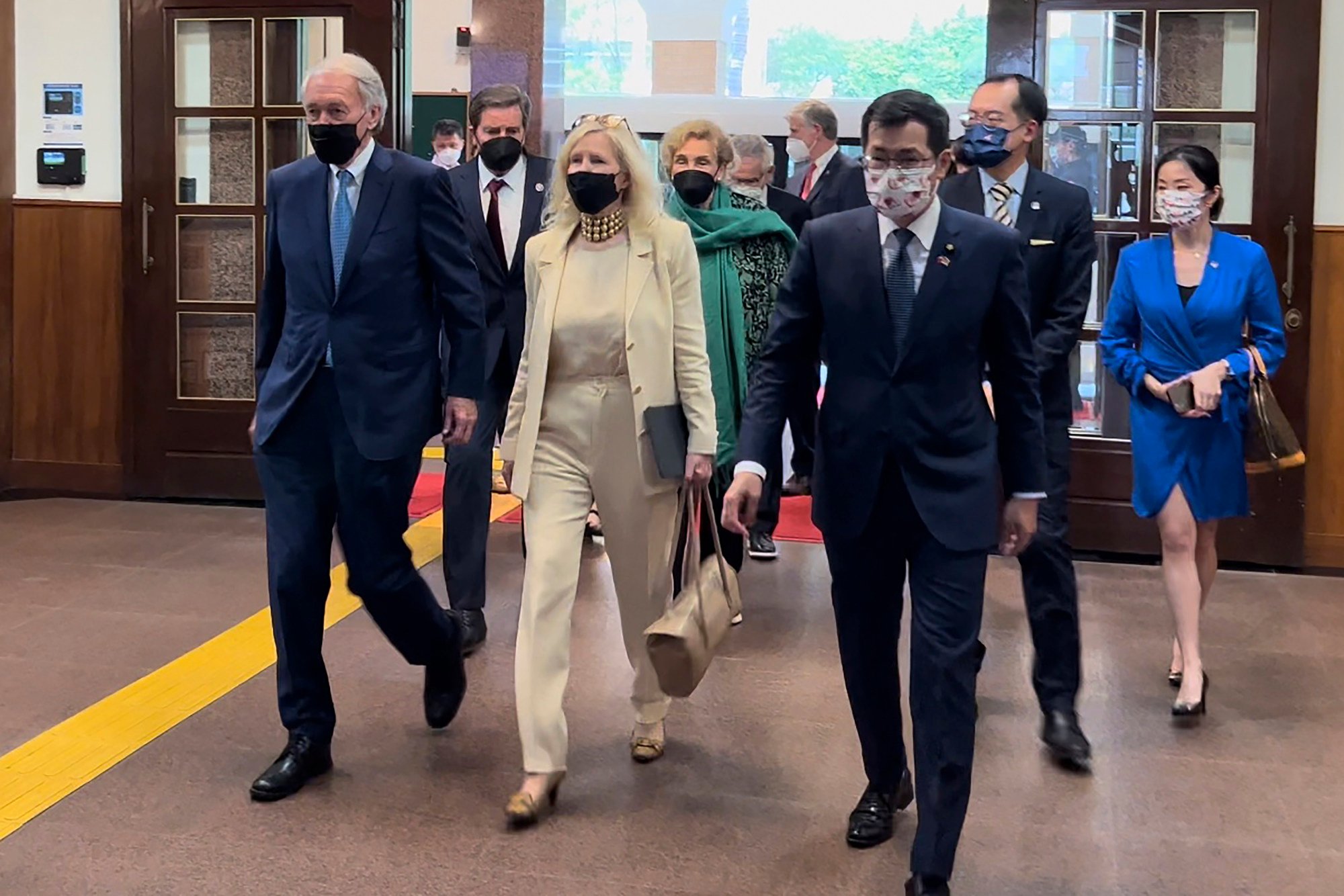
Unlike Pelosi’s meeting with Tsai which was open to media coverage in the first hour, Monday’s meeting between Tsai and the group was kept behind closed doors. Tsai’s office released a statement about the meeting only after the group left Taiwan.
Markey said in a tweet that he and his group had travelled to the island “to reaffirm US support for Taiwan and encourage stability and peace across the Taiwan Strait”.
His office said in a statement the group would meet “elected leaders and members of the private sector to discuss shared interests, including reducing tensions in the Taiwan Strait and expanding economic cooperation, including investments in semiconductors”.
Reuters cited Beijing’s embassy in Washington as saying on Sunday that the latest congressional visit “proves that the US does not want to see stability across the Taiwan Strait and has spared no effort to stir up confrontation between the two sides and interfere in China’s internal affairs”.
Lin Yu-fang, head of the security division of National Policy Foundation, a think tank affiliated with the main opposition Kuomintang party in Taipei, said he did not expect the PLA drills would be on the scale of those in response to Pelosi’s visit.
“Pelosi is a long-time critic of Beijing … and her high-profile trip to Taiwan, which even included a meeting with a group of pro-democracy activists, sharply enraged the mainland, which retaliated by staging massive war games and lobbing ballistic missiles to ramp up pressure on Taiwan,” he said.
Though Markey is head of the East Asia affairs subcommittee, his status was not as sensitive as Pelosi’s. “The intensity of new drills targeting Taiwan is expected to be lower,” he said.
The defence ministry in Taiwan said PLA aircraft were spotted on 30 sorties to waters near Taiwan, with 15 crossing the median line that separates the island and the mainland. Five PLA warships were also detected in waters nearby.
Koh King Kee, president of Malaysian think tank the Centre for New Inclusive Asia, said Beijing had “routinised” military drills so future exercises would not be directly caused or dictated by political developments surrounding Taiwan.
But Pelosi’s trip had “accentuated China’s sensitivity” to future visits to Taiwan by foreign politicians, Koh said.
“China considers successive visits by US politicians as Washington’s intentional act to hollow out the one-China policy, which tampers with the basic norms of China-US relations and violates China’s sovereignty and territorial integrity,” he said.
“Individual sanctions on foreign politicians will probably be the most common form of retaliation Beijing will take. However, depending on the seniority of the foreign politician, Beijing could also cut off bilateral engagement or cooperation with the country where the foreign politician comes from, or in the extreme scenario, downgrade the diplomatic relations between the two countries.
“China could also amend its Anti-Secession Law to include provocative visits by foreign politicians.”
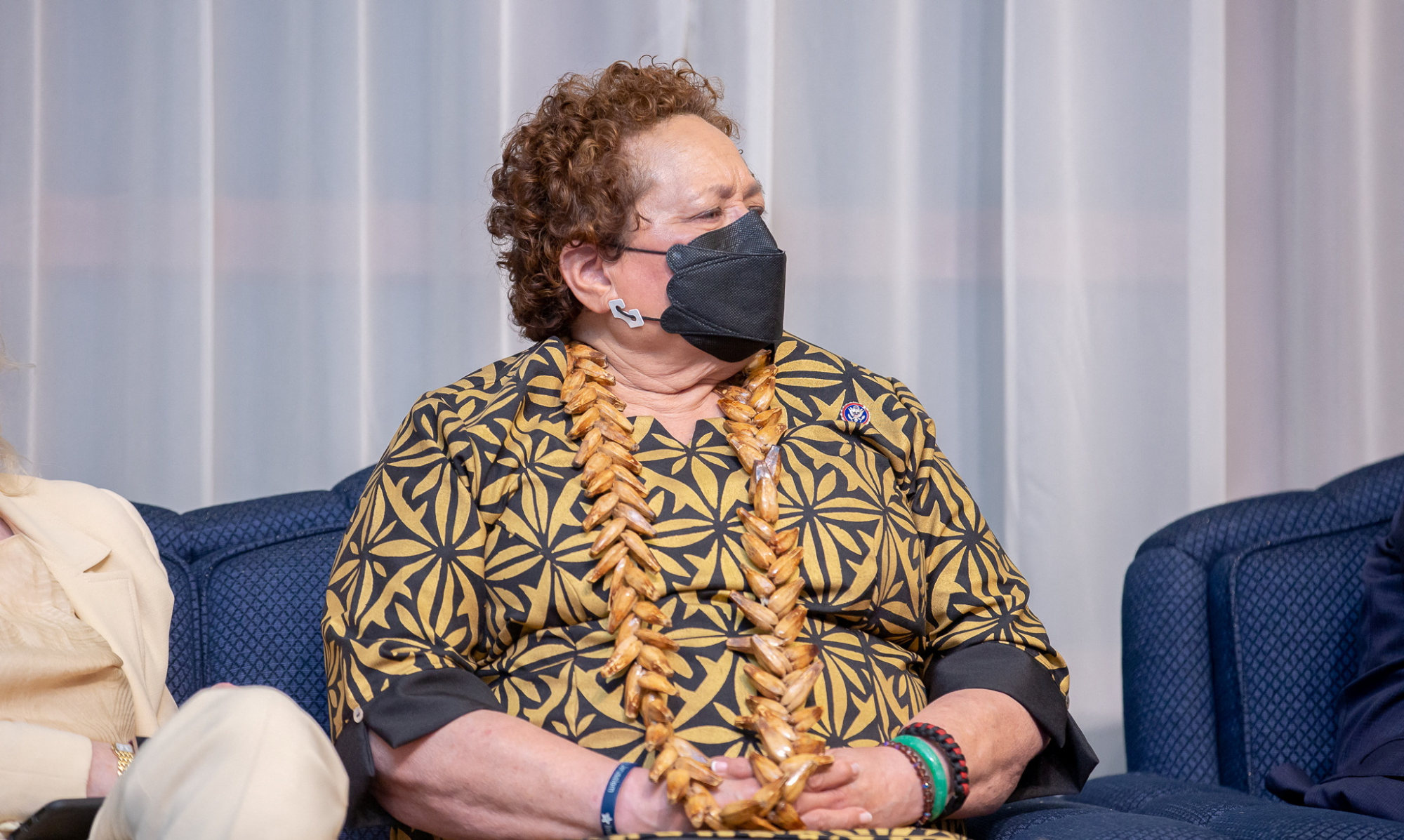
The other members of the delegation are Republican Aumua Amata Coleman Radewagen, a delegate from American Samoa, and Democratic House members John Garamendi and Alan Lowenthal from California and Don Beyer from Virginia.
Markey voted for the Taiwan Relations Act – which underscores US ties with the island in the absence of formal relations – in 1979 when he was a House member. He is one of a few members of Congress who voted for the act and are still serving.
“China is responding to these provocations across all fronts: diplomatic, informational, military and economic,” said Andy Mok, a senior research fellow at the Centre for China and Globalisation, a non-governmental think tank in Beijing.
“And we can expect further responses in both scope and magnitude as provocations and responses continue to escalate.”
Additional reporting by Cyril Ip


